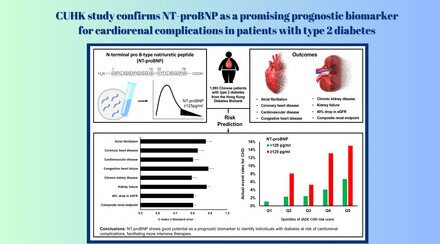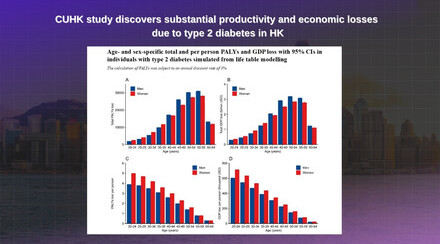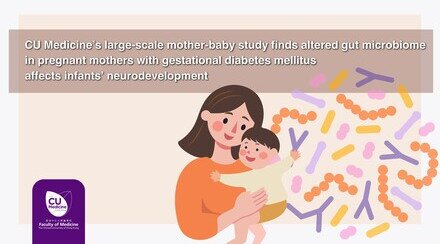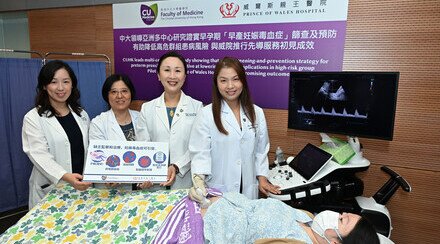CUHK survey finds half of pregnant women have excessive sodium intake during early pregnancy
Maternal nutrition and lifestyle habits before and during early pregnancy are important determinants for the foetus’s growth and development. A survey conducted by The Chinese University of Hong Kong (CUHK)’s Faculty of Medicine (CU Medicine) found that half of pregnant women had excessive sodium intake during early pregnancy, with the mean daily intake double that of the World Health Organization (WHO)’s recommendation. In addition, 97% of the survey participants did not meet the recommended fibre intake.
The survey also showed that the participants had an insufficient intake of important micronutrients such as calcium and iron in their diet. The researchers suggested that pregnant women should increase the frequency with which they consume fresh fruits and vegetables. Also, nutritional supplements should not be regarded as substitutes for healthy diets, and unhealthy dietary patterns increase the risk of pregnancy problems including being overweight and suffering from gestational diabetes mellitus, large babies and postpartum weight retention.
This is the first study to investigate the dietary patterns and nutritional intake of women in early pregnancy in Hong Kong. Details of the survey have been published in the Asia Pacific Journal of Clinical Nutrition.
97% of the survey participants did not meet the recommended fibre intake, while the general intake of micronutrients was insufficient
During 2017 to 2018, almost 160 women who were less than 14 weeks pregnant were randomly recruited at their first antenatal visit. Their dietary intake in the previous three months was assessed through a detailed food frequency questionnaire. Their pregnancy outcomes were also recorded, based on medical records or phone interviews. The key findings are as follows:
- 97% of the survey participants did not meet the recommended fibre intake. Their mean fibre intake was 14g per day, compared to the WHO’s recommendation of 25g per day.
- 50% of the survey participants had excessive daily sodium intake. Their mean sodium intake was 3,984mg per day, compared to the WHO’s recommended upper limit of 2,000mg per day, or about one teaspoon of salt (5g).
- The percentages of pregnant women with insufficient daily intake of vitamin C, calcium, iron and zinc were 46%, 74%, 90% and 33% respectively, compared to the Chinese Dietary Reference Intakes 2013.
- Fat intake should be limited to 15% to 30% of total daily energy, but the mean fat intake of the participants was 37% of total energy.
- 94% of the survey participants were regularly taking nutritional supplements, including multi-vitamins, minerals, folate and fish oil, and more than half of them were taking two or more types of nutritional supplements.
Pregnant women should not rely too much on nutritional supplements

Professor Ronald Ma reminds the pregnant women that a prolonged excess intake of sodium can increase the risk of high blood pressure and other cardiovascular diseases over time.

Dr Tsoi Kit-ying suggests pregnant women to increase their consumption of healthy, fresh, unprocessed food for obtaining sufficient essential micronutrients, instead of relying on taking nutritional supplements.
Dr Tam Wing-hung, Clinical Professor (Honorary) in the Department of Obstetrics and Gynaecology at CU Medicine, explained, “The dietary and nutritional status of the mother before pregnancy and during early pregnancy is very important for the growth and development of the foetus. Our studies have shown that maternal diet is also closely related to various pregnancy complications. Suboptimal dietary habits such as excessive intake of sugar, meat and processed food, as well as low dietary fibre intake, are associated with an increased risk of gestational diabetes.”
Dr Tsoi Kit-ying, post-doctoral fellow from CU Medicine’s Department of Medicine and Therapeutics, said, “Our survey revealed that unhealthy dietary behaviour is common among pregnant women in Hong Kong. To obtain sufficient essential micronutrients, we suggest they increase their consumption of healthy, fresh, unprocessed food, rather than relying on nutritional supplements.”
Professor Ronald Ma Ching-wan, Head of the Division of Endocrinology and Diabetes (Academic Affairs) in the Department of Medicine and Therapeutics at CU Medicine, added, “Sodium is often hidden in many condiments and processed food at high levels. We assume that the excessive sodium intake of the interviewed pregnant women was likely associated with the frequent consumption of these foods, and the tendency to eat out. A prolonged excess can increase the risk of high blood pressure and other cardiovascular diseases over time. Unbalanced dietary patterns may also cause long-term adverse effects on both mothers and foetuses.”
The research team suggested that daily consumption of fruits, vegetables, nuts and other foods rich in vitamins, minerals, antioxidants and fibre can help with metabolism and blood pressure. Pregnant women are also encouraged to increase the frequency with which they eat fresh fruits and vegetables, including when they eat out.

Ms Poon (right) shares that she did not cut all the intake of her favourite food during pregnancy but carefully controlled the amount of those food.














































